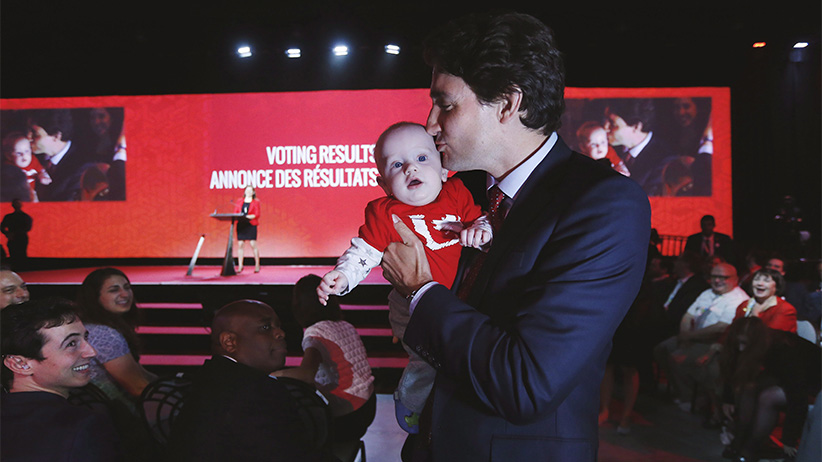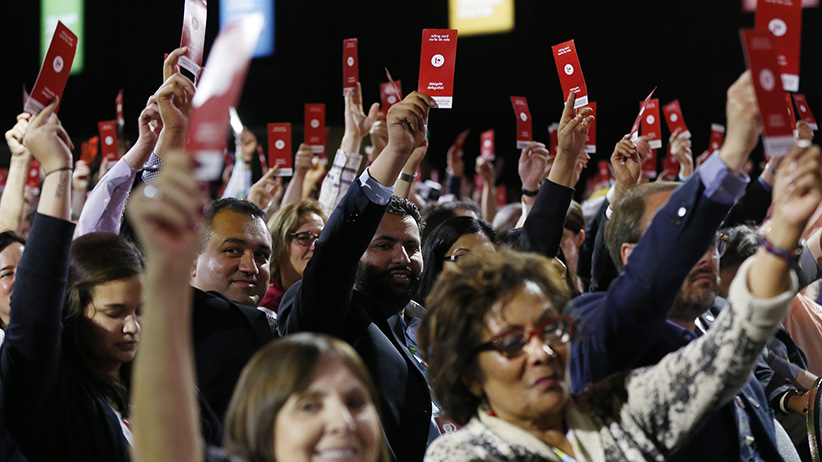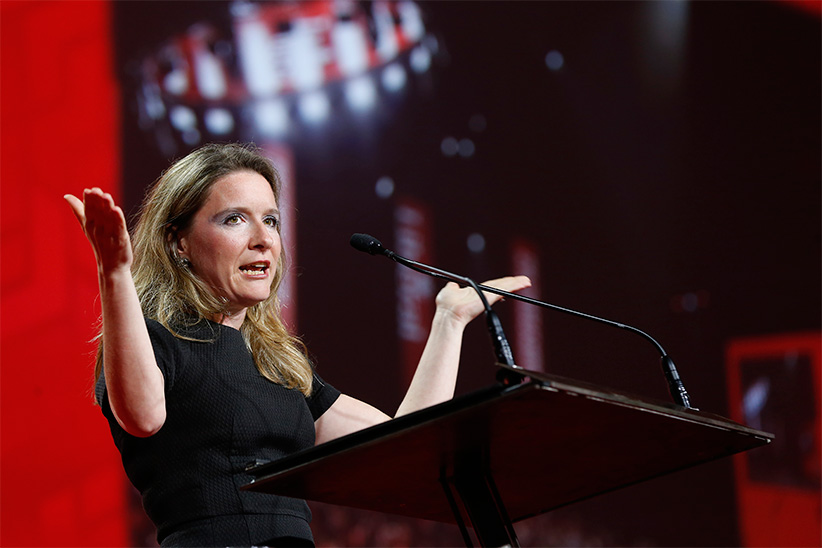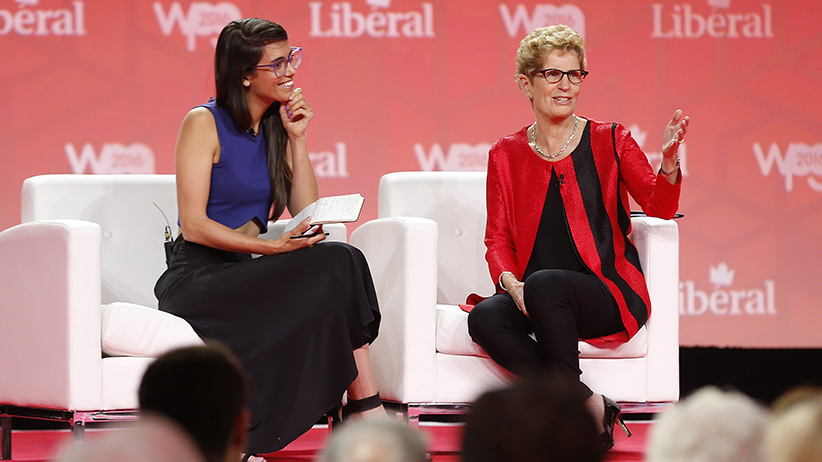Liberals won. Now what? The gap between pomp and policy
Fresh from a policy convention, the exuberant Liberals must make real change in Ottawa. Can they do it?
Macleans Magazine’s Ottawa and Montreal bureau head shots at Third Floor York studio in Ottawa December 12, 2013.
Photo by Blair Gable
Share

Prime Minister Justin Trudeau had a little fun at the expense of Conservatives last weekend. In his keynote speech to a Liberal policy convention in Winnipeg, Trudeau switched on his mischievous grin as he noted that the Tories, who happened to be simultaneously gathered in Vancouver for their own convention, were debating same-sex marriage—more than a decade after it became legal in Canada. “Who knows,” he said, “10 years from now, they might finally be willing to admit that climate change is real.”
The partisan throng, needless to say, roared with laughter. More than a timely, easy jab at the opposition, though, Trudeau’s patter about slow-moving Tories jibed perfectly with the sense among the ascendant Liberals partying in Winnipeg that their majority government in Ottawa has, by contrast, already proven itself to be the agent of swift, definitive change. Delegates carried around mental checklists of symbolic firsts, like Trudeau’s appointment of a cabinet with equal numbers of men and women, and historic moments, like his signing last fall of the United Nations climate agreement in Paris.
Yet few seemed to notice Trudeau’s fleeting note of caution about the possible pace of progress. In the Prairie city that is Canada’s unofficial urban Aboriginal capital, he boasted of having already taken “real, positive steps” toward boosting the opportunities available to First Nations, Inuit and Metis people. Then he added, “We know these changes won’t happen overnight, or even over the course of a single mandate, but we’re not letting that stand in our way.”
Not overnight, of course. But not even over the four-year lifetime of his muscular House majority? This was a nod to realism, although it didn’t break Trudeau’s flow. He moved briskly along to tout, for instance, his widely admired welcoming of Syrian refugees and his government’s recent introduction of legislation to extend legal protection to transgender people. Still, that passing allusion to the need for patience on Indigenous files is worth pausing to consider. He might have said the same about, say, cutting greenhouse gas emissions, or raising middle-class incomes, or fixing federal military procurement—or making serious headway on just about any major policy problem.
There is an obvious gap between Trudeau’s celebrated ability to serve up emblematic moments and his government’s still largely unproven capacity for delivering substantial policy. Of course, after only seven months in power, Liberals might fairly protest that they haven’t had nearly enough time. And they can point, as Trudeau did in his Winnipeg speech, to at least one hefty policy accomplishment: the new Canada Child Benefit, which will begin delivering more money in July to nine out of 10 families than the raft of federal payments to parents it replaces.
But a scan down the list of thorny problems on First Nations policy alone leaves little doubt about why Trudeau might want to plead for time. He has promised to fix perennially underperforming reserve schools, substandard housing and failed water systems. Indigenous Affairs Minister Carolyn Bennett is grappling with highly sensitive questions surrounding how to set up the anxiously awaited inquiry into missing and murdered Indigenous women. As well, Ottawa faces new court-directed obligations for Metis and non-status Aboriginals, while a Canadian Human Rights Tribunal finding demands better on-reserve child welfare and social services.
So far, the Liberals are enjoying support from Aboriginal leaders that would have been unthinkable for Stephen Harper’s Tory government. From the stage at the Winnipeg convention, Kevin Hart, Manitoba regional chief of the Assembly of First Nations, offered encouraging words. As the AFN’s designated point man on water, infrastructure and housing, Hart is a key interlocutor. In an interview just outside the convention centre, he praised the way the Liberals inside have been consulting on a range of issues.
Still, Hart also suggested a lengthy process has only just begun. “We’re gathering our chiefs and technicians from across Canada and sitting down with [federal officials] to start talking about these reviews and stuff, and having First Nations input in the decision-making,” he said. Not surprisingly, he said money is likely to be a major point of contention. The 2016 federal budget pledged new funding of $8.4 billion over five years across all Indigenous files, but Hart contends that AFN studies show $3 billion is needed just to bring on-reserve housing up to an acceptable standard—in Manitoba alone.
A few blocks away from the busy corridors of the downtown RBC Convention Centre, at a quiet corner table in the hipster-approved Thom Bargen coffee spot, Wab Kinew pondered the Trudeau government’s approach. Elected as a rookie NDP member of the provincial legislature in this spring’s Manitoba election, Kinew, 34, was previously courted by the federal Liberals. As a prominent former CBC broadcaster and author of the memoir The Reason You Walk, he has emerged as an unignorable First Nations voice. Despite having chosen a different partisan stripe, he praises Trudeau for appointing Justice Minister Jody Wilson-Raybould, a B.C. First Nations leader, and also credits Bennett’s consultative style.
But Kinew also sees pitfalls and potential for frustration. The Trudeau Liberals’ first budget fell short, he says, on bringing on-reserve schools up to provincial levels of per-student funding. They are hedging, as he hears it, on how much they might invest in on-reserve social services and children’s welfare. Then there’s the even deeper question of who will have the final say on how the new money that has been allocated is spent. “When I talk to my Liberiginal friends, they are like, ‘They gave us $8 billion!’ But they didn’t give us $8 billion; they gave the Department of Indigenous and Northern Affairs $8 billion,” he says. “It’s not communities determining their own destinies.”

Even more sweepingly, Kinew identifies a prevailing mood among Liberals, sustained since the election of Trudeau’s majority last Oct. 19, which might make an eventual plunge into disappointment inevitable. “There is,” he says, “a tendency toward euphoria.”
That tendency wasn’t hard to detect at the Winnipeg convention. The mere presence of Trudeau in the building instantly generated a campaign-style atmosphere of anticipation and excitement. He arrived in Winnipeg direct from the G7 summit in Japan. When his face first appeared on the big screens in the main hall, early Saturday afternoon, his eyes betrayed a hint of ocean-crossing, time-zone-hopping weariness. But just a hint. After one session in the main hall, which was on the convention centre’s upper level, the Prime Minister retreated to a temporary HQ on the ground floor—bounding down the escalator so fast that delegates going up the other way barely had time to fumble their smartphones out of pockets and purses to take a picture, while members of Trudeau’s entourage appeared to be in serious danger of falling as they stumbled along in his wake, trying to keep up.
Trudeau often seems to be pulling the whole Liberal apparatus along in his slipstream. At the convention, however, his strategists were working to make the party less reliant on his skills. They passed a new party constitution, designed to strengthen the bond between ordinary members and the national leadership, de-emphasizing provincial and territorial wings. Trudeau described it as a way of “closing the distance between the leader and every single contributor to this movement we’ve built,” while ending “the era of factional battles and hyphenated Liberals, of regional chieftains and behind-the-scenes power brokers, of the closed, insular thinking that almost killed this party.”
Related: Photos from the Liberal convention
There was a certain irony in Trudeau declaring that familiar breed of Liberal—the behind-the-scenes power broker—an endangered species. In fact, the party celebrated its unelected insiders in Winnipeg with unprecedented enthusiasm. The most eagerly anticipated event of the convention, aside from Trudeau’s speech, was an address by Katie Telford, his chief of staff, who was co-chair of last year’s Liberal election campaign. This was unusual. Telford’s most successful predecessors, like Jean Pelletier, former prime minister Jean Chrétien’s guarded chief of staff, would never have stepped from the shadows into the spotlight in the same way.

Just as unorthodox was the video compendium of interviews with Trudeau’s top strategists—most prominently Gerald Butts, his principal secretary and close friend from McGill University days—shown to delegates just before Telford spoke. Canadian federal parties have traditionally avoided showcasing strategists, in favour of putting MPs or potential future candidates on display. But this video framed Telford as part of a crack team, and seemed to invite ordinary Liberals to identify with them.
Her speech built on that theme by offering rank-and-file delegates a glimpse inside the 2015 campaign’s control rooms. “We spent our days and many nights talking about numbers, and turning each one of them into a meaningful element of the campaign,” Telford said. “But my co-conspirator that you saw in the video earlier, Gerry Butts, would swing by headquarters early on in the campaign, on a down day for the plane, and he would remind us what the numbers were really about, what he was seeing out there on the road.” She went on to tell about how Butts stood on a chair in Liberal HQ to scrawl a message high on a whiteboard. “He wrote three words: People, people, people,” Telford said. “That was really what the campaign was about.”
At another point in the life of a government, in a less breathless moment in the life of a party, that sort of mythologizing of insiders might be resented. Not now, though, not among Liberals revelling in how last fall’s flush of victory evolved into this year’s pulse of power. “Somebody like Katie has incredible things to offer,” said Winnipeg MP Kevin Lamoureux. “What’s wrong with taking people out of the backroom to the front room, where there’s a lot more transparency, so [convention delegates] have sense of what some of these individuals are thinking, how they’re thinking, what they want us to evolve into?”
So many new Liberals have joined the party since Trudeau became leader that it’s little wonder he and his inner circle command such loyalty. All they’ve known under him is victory. In his caucus, 139 of the 184 Liberal MPs are rookies. Among them, few know as much as Greg Fergus, first-time MP for a Quebec riding just across the river from Ottawa, about the party’s struggles before Trudeau came along.
Fergus was appointed the party’s national director by then-leader Stéphane Dion in 2007, when the governing Conservatives far outstripped the Liberals in organizational prowess and fundraising results. He was a key player in efforts back then to try to close the gap, to turn the party from an elite-run club to a member-driven movement. When Trudeau launched his leadership bid in the fall of 2012, he promised to make fostering grassroots connections his top priority. “People thought that was just lip service,” Fergus said in a corridor interview at the Winnipeg confab. “It wasn’t lip service.”

According to Fergus, Trudeau’s sustained outreach to members and supporters has given his inner circle a rapport with the rank-and-file that power brokers of earlier eras couldn’t have hoped to cultivate. “Let me explain,” he says when asked about the aura around Butts and Telford. “These were the folks who took [Trudeau’s] approach to the grassroots and torqued it in ways we’ve never seen in this country before. All the candidates, campaign teams, we feel close to these guys. These were the guys on our conference calls. These were the guys we picked up the phone and called directly.”
The question remains whether the Trudeau crew that revived the party and won the election can prove itself equally effective as the brains behind an activist government. On that score, most of the big moves have been put off. For instance, the March 22 budget took only first steps, leaving it up to a new advisory council to propose bigger ideas to deliver the economic growth Trudeau promised so often on the campaign trail. And while the UN climate agreement late last year was heralded as a landmark, at his meeting with premiers three months later Trudeau could only secure agreement to study possible ways to make good on his Paris commitment to slash greenhouse gas emissions.
Major advances on economic or environmental files would go a long way to building a case for Trudeau as something more than a gifted campaigner with a crafty team. But in Winnipeg, for many Liberals, solving the array of Indigenous issues was even more top of mind. Asked what policy breakthroughs would be enough to call Trudeau’s first mandate a success, Fergus didn’t miss a beat. “Resetting the relationship with Aboriginal peoples,” he said. “Everybody is of goodwill. The resources are there. So let’s make it reality.” On the other hand, as Trudeau said, these things can’t be done overnight—not even by today’s euphoric Liberals.